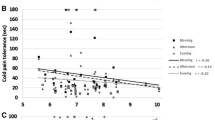Abstract
Self-report data suggest that sleep hot flashes among menopausal women are associated with sleep problems and in turn impaired psychological functioning. However, few studies have examined these relations with physiologic hot flash measures. A total of 41 perimenopausal and postmenopausal women with daily hot flashes underwent nighttime sternal skin conductance monitoring to quantify hot flashes. Participants completed sleep diaries; the Sleep-Wake Experience List (van Diest, 1990); and depression, anxiety, and daily stress measures. Participants experienced a median of 2 physiologically monitored and 1 reported sleep hot flash nightly. Although sleep complaints were significantly and positively associated with psychological functioning, neither sleep complaints nor psychological functioning was significantly related to frequency of physiologically monitored sleep hot flashes. Conversely, results indicate an association between reported sleep hot flashes and acute sleep problems. The frequency of physiologically monitored sleep hot flashes, as opposed to reported sleep hot flashes, may be independent of problems with sleep and mood among menopausal women.
Similar content being viewed by others
References
Avis, N. E., Brambilla, D., McKinlay, S. M., & Vass, K. (1994). A longitudinal analysis of the association between menopause and depression. Results from the Massachusetts Women’s Health Study. Annals of Epidemiology, 4, 214–220.
Avis, N. E., Stellato, R., Crawford, S., Bromberger, J., Ganz, P., Cain, V., et al. (2001). Is there a menopausal syndrome? Menopausal status and symptoms across racial/ethnic groups. Social Science & Medicine, 52, 345–356.
Barsky, A. J., Goodson, J. D., Lane, R. S., & Cleary, P. D. (1988). The amplification of somatic symptoms. Psychosomatic Medicine, 50, 510–519.
Beck, A. T., Steer, R. A., & Brown, G. K. (1996). Beck Depression Inventory manual (2nd ed.). Orlando, FL: Psychological Corporation.
Beck, A. T., Steer, R. A., & Garbin, M. G. (1988). Psychometric properties of the Beck Depression Inventory: Twenty-five years of evaluation. Clinical Psychology Review, 8, 77–100.
Brantley, P., Waggoner, C., Jones, G., & Rappaport, N. (1987). A daily stress inventory: Development, reliability, and validity. Journal of Behavioral Medicine, 10, 61–74.
Bromberger, J. T., Assmann, S. F., Avis, N. E., Schocken, M., Kravitz, H. M., & Cordal, A. (2003). Persistent mood symptoms in a multiethnic community cohort of pre- and perimenopausal women. American Journal of Epidemiology, 158, 347–356.
Bromberger, J. T., & Matthews, K. A. (1996). A longitudinal study of the effects of pessimism, trait anxiety, and life stress on depressive symptoms in middle-aged women. Psychology and Aging, 11, 207–213.
Bromberger, J. T., Meyer, P. M., Kravitz, H. M., Sommer, B., Cordal, A., Powell, L., et al. (2001). Psychologic distress and natural menopause: a multiethnic community study. American Journal of Public Health, 91, 1435–1442.
Carpenter, J. S., Andrykowski, M. A., Freedman, R. R., & Munn, R. (1999). Feasibility and psychometrics of an ambulatory hot flash monitoring device. Menopause, 6, 209–215.
Carpenter, J. S., Gautam, S., Freedman, R. R., & Andrykowski, M. (2001). Circadian rhythm of objectively recorded hot flashes in postmenopausal breast cancer survivors. Menopause, 8, 181–188.
Collins, A., & Landgren, B. M. (1994). Reproductive health, use of estrogen and experience of symptoms in perimenopausal women: a population-based study. Maturitas, 20, 101–111.
Craig, K. D. (1994). Emotional Aspects of Pain. In P. D. Wall & R. Melzack (Eds.), Textbook of pain (pp. 261–274). New York: Edinburgh.
Dennerstein, L., Dudley, E. C., Hopper, J. L., Guthrie, J. R., & Burger, H. G. (2000). A prospective population-based study of menopausal symptoms. Obstetrics and Gynecology, 96, 351–358.
Dennerstein, L., Smith, A. M., Morse, C., Burger, H., Green, A., Hopper, J., et al. (1993). Menopausal symptoms in Australian women. The Medical Journal of Australia, 159, 232–236.
Erlik, Y., Tataryn, I. V., Meldrum, D. R., Lomax, P., Bajorek, J. G., & Judd, H. L. (1981). Association of waking episodes with menopausal hot flushes. Journal of the American Medical Association, 245, 1741–1744.
Freedman, R. R. (1989). Laboratory and ambulatory monitoring of menopausal hot flashes. Psychophysiology, 26, 573–579.
Freedman, R. R., & Roehrs, T. A. (2004). Lack of sleep disturbance from menopausal hot flashes. Fertility and Sterility, 82, 138–144.
Gath, D. (1998). The assessment of depression in peri-menopausal women. Maturitas, 29, 33–39.
Gold, E. B., Sternfeld, B., Kelsey, J. L., Brown, C., Mouton, C., Reame, N., et al. (2000). Relation of demographic and lifestyle factors to symptoms in a multi-racial/ethnic population of women 40-55 years of age. American Journal of Epidemiology, 152, 463–473.
Hollander, L. E., Freeman, E. W., Sammel, M. D., Berlin, J. A., Grisso, J. A., & Battistini, M. (2001). Sleep quality, estradiol levels, and behavioral factors in late reproductive age women. Obstetrics and Gynecology, 98, 391–397.
Hunter, M. S. (1990). Psychological and somatic experience of the menopause: A prospective study [corrected]. Psychosomatic Medicine, 52, 357–367.
Kaufert, P. A., Gilbert, P., & Tate, R. (1992). The Manitoba Project: A re-examination of the link between menopause and depression. Maturitas, 14, 143–155.
Kravitz, H. M., Ganz, P. A., Bromberger, J., Powell, L. H., Sutton-Tyrrell, K., & Meyer, P. M. (2003). Sleep difficulty in women at midlife: a community survey of sleep and the menopausal transition. Menopause, 10, 19–28.
Kronenberg, F. (1990). Hot flashes: Epidemiology and physiology. Annals of the New York Academy of Sciences, 592, 52–86, 123-133.
Kuh, D. L., Wadsworth, M., & Hardy, R. (1997). Women’s health in midlife: The influence of the menopause, social factors and health in earlier life. British Journal of Obstetrics and Gynaecology, 104, 923–933.
Ledesert, B., Ringa, V., & Breart, G. (1994). Menopause and perceived health status among the women of the French GAZEL cohort. Maturitas, 20, 113–120.
McKinlay, J. B., McKinlay, S. M., & Brambilla, D. (1987). The relative contributions of endocrine changes and social circumstances to depression in mid-aged women. Journal of Health and Social Behavior, 28, 345–363.
McKinlay, S. M., Brambilla, D. J., & Posner, J. G. (1992). The normal menopause transition. Maturitas, 14, 103–115.
Mitchell, E. S., & Woods, N. F. (1996). Symptom experiences of midlife women: Observations from the Seattle Midlife Women’s Health Study. Maturitas, 25, 1–10.
Moe, K. E. (1999). Reproductive hormones, aging, and sleep. Seminars in Reproductive Endocrinology, 17, 339–348.
Neugarten, B. L., & Kraines, R. J., (1965). “Menopausal Symptoms” in Women of Various Ages. Psychosomatic Medicine, 27, 266–273.
Owens, J. F., & Matthews, K. A. (1998). Sleep disturbance in healthy middle-aged women. Maturitas, 30, 41–50.
Polo-Kantola, P., Erkkola, R., Irjala, K., Helenius, H., Pullinen, S., & Polo, O. (1999). Climacteric symptoms and sleep quality. Obstetrics and Gynecology, 94, 219–224.
Shaver, J. L., Johnston, S. K., Lentz, M. J., & Landis, C. A. (2002). Stress exposure, psychological distress, and physiological stress activation in midlife women with insomnia. Psychosomatic Medicine, 64, 793–802.
Spielberger, C. D. (1983). Manual for the State-Trait Anxiety Inventory. Palo Alto, CA: Consulting Psychologists Press.
Thurston, R. C., Blumenthal, J. A., Babyak, M. A., & Sherwood, A. (2005). Emotional antecedents of hot flashes during daily life. Psychosomatic Medicine, 67, 137–146.
van Diest, R. (1990). Subjective sleep characteristics as coronary risk factors, their association with Type A behaviour and vital exhaustion. Journal of Psychosomatic Research, 34, 415–426.
van Diest, R., & Snel, J. (1990). The Sleep Wake Experience List. In J. A. Home (Ed.), Sleep ‘90: Proceedings of the 10th European Congress on Sleep Research, Strasbourg (France), May 20-25. Bochum, Germany: Pontenagel Press.
Woods, N. F., & Mitchell, E. S. (1997). Pathways to depressed mood for midlife women: Observations from the Seattle Midlife Women’s Health Study. Research in Nursing & Health, 20, 119–129.
Woodward, S., & Freedman, R. R. (1994). The thermoregulatory effects of menopausal hot flashes on sleep. Sleep, 17, 497–501.
Young, T., Rabago, D., Zgierska, A., Austin, D., & Laurel, F. (2003). Objective and subjective sleep quality in premenopausal, perimenopausal, and postmenopausal women in the Wisconsin Sleep Cohort Study. Sleep, 26, 667–672.
Author information
Authors and Affiliations
Corresponding author
Rights and permissions
About this article
Cite this article
Thurston, R.C., Blumenthal, J.A., Babyak, M.A. et al. Association between hot flashes, sleep complaints, and psychological functioning among healthy menopausal women. Int. J. Behav. Med. 13, 163–172 (2006). https://doi.org/10.1207/s15327558ijbm1302_8
Issue Date:
DOI: https://doi.org/10.1207/s15327558ijbm1302_8




